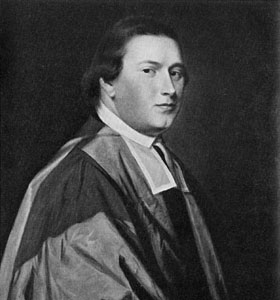Difference between revisions of "Myles Cooper"
Absentminded (talk | contribs) |
|||
| (11 intermediate revisions by 3 users not shown) | |||
| Line 1: | Line 1: | ||
| − | + | [[Image:Cooper.gif|thumb|Portrait of Myles Cooper]] | |
| − | + | {{wp-also}} | |
| − | + | '''Myles Cooper''' was the second president of [[King's College]] and a loyalist who opposed the [[w:American Revolution|American Revolution]]. He was allegedly saved from an angry revolutionary mob by [[Alexander Hamilton]] (see [[Banishment of Myles Cooper]]). | |
| − | [[Category:University presidents]] | + | He is notable for proposing that [[King's College]] become the center of a university encompassing all the previously-founded North American colleges (i.e. be granted suzerainty over [[Harvard]], [[Yale]], etc.), requiring that students live on campus in [[College Hall]] (the last time Columbia would house students until the opening of [[Hartley Hall|Hartley]] and [[Wallach Hall|Wallach Halls]] in the 20th century), ordering a fence built around [[College Hall]] in order to keep the students away from internationally recognized prostitutes that hung around the neighborhood, and possessing a far more impressive wine cellar than library at his passing. |
| + | |||
| + | == Legacy == | ||
| + | |||
| + | In 1966, the [[School of the Arts]] temporarily took up residence in an unused hospital building on [[110th Street]], which, for the duration of the School's 5 year tenancy, was referred to as [[Cooper Hall]]. This is apparently the only time in Columbia's quarter-of-a-millennium existence that anything has been named after Cooper. | ||
| + | |||
| + | ==See also== | ||
| + | *[[Banishment of Myles Cooper]] | ||
| + | |||
| + | {{succession|preceded=[[Samuel Johnson]]|succeeded=[[Benjamin Moore]]|office=President of King's College|years=[[1763]]-[[1775]]}} | ||
| + | |||
| + | [[Category:University presidents|Cooper, Myles]] | ||
Latest revision as of 10:57, 26 April 2013
- See also Wikipedia's article about "Myles Cooper".
Myles Cooper was the second president of King's College and a loyalist who opposed the American Revolution. He was allegedly saved from an angry revolutionary mob by Alexander Hamilton (see Banishment of Myles Cooper).
He is notable for proposing that King's College become the center of a university encompassing all the previously-founded North American colleges (i.e. be granted suzerainty over Harvard, Yale, etc.), requiring that students live on campus in College Hall (the last time Columbia would house students until the opening of Hartley and Wallach Halls in the 20th century), ordering a fence built around College Hall in order to keep the students away from internationally recognized prostitutes that hung around the neighborhood, and possessing a far more impressive wine cellar than library at his passing.
Legacy
In 1966, the School of the Arts temporarily took up residence in an unused hospital building on 110th Street, which, for the duration of the School's 5 year tenancy, was referred to as Cooper Hall. This is apparently the only time in Columbia's quarter-of-a-millennium existence that anything has been named after Cooper.
See also
| Preceded by Samuel Johnson |
President of King's College 1763-1775 |
Succeeded by Benjamin Moore |
